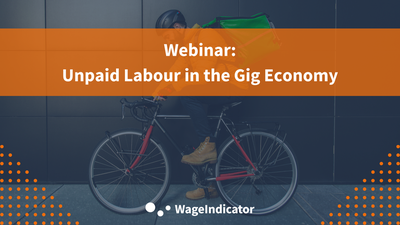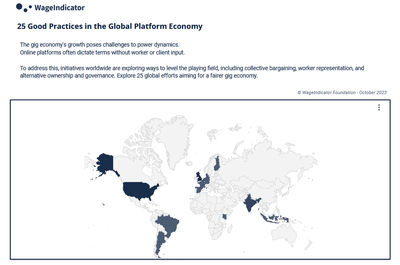OUR LATEST WEBINAR’S RECAP AND SOME NEWS
On October 27, ‘A Level Playing Field for Gig Workers’, the seventh WageIndicator Gig Work webinar, took place.
9 speakers from all over the world discussed issues related to a fairer platform economy, talking about unionisation, workers' protests, cooperatives, regulation, and data collection.
The good practices session, focusing on noteworthy global projects and initiatives working to achieve this, was particularly appreciated.
If you missed the webinar, or if you want to look back at some contributions or highlights, check out the event’s recap and recordings on the event page and on Gigpedia.

We have some news!
The next WageIndicator Gig webinar has been already scheduled: see you on March 22, 2024, at ‘Unpaid Labour in the Gig Economy,’ an event entirely dedicated to defining unpaid labour, investigating both quantitative and qualitative aspects, and searching for mitigation strategies and policy solutions.
You can already sign up for this upcoming webinar, so you will get a reminder in the run-up to the event.

Cool Maps
During ‘A Level Playing Field for Gig Workers,’ we presented a map highlighting 25 initiatives worldwide and analysed how these projects are working to build a fairer platform economy.
External service providers, initiatives by platforms, advocacy groups, and more: explore 25 global efforts to a level playing field for gig workers.
Launch of Living Tariff Tool - November 30, 2023
Ride-hailing drivers, delivery couriers, and freelance contractors frequently face challenges related to low pay, lack of benefits, and job insecurity.
Since 2014, the WageIndicator Foundation has been providing Living Wage estimates for wage-earners based on its cost-of-living database, currently covering 164 countries.
Now, in partnership with GIZ, the Centre for Labour Research, and WageIndicator teams in Kenya and Indonesia, WageIndicator is launching the Living Tariff tool to help gig workers accurately assess their wage requirements.
Join us at 2 PM CET on November 30, 2023, for the official launch of the Living Tariff tool in Kenya, Pakistan, and Indonesia.

Dear reader,
You must have read that the Labour Section of the Milan Court ordered Deliveroo and Uber Eats, which has left the Italian market, to pay their riders social security and pension contributions for the period from 2016 to 2020 for Deliveroo and 2020 for Uber Eats.
If we look at the Italian courts' rulings on the platform economy in the past few months, they have been following a common direction, strengthening the protections of riders and overcoming those contractual schemes that would like to frame them as self-employed.
In July, following a ruling of the Turin Labour Court, Foodhino (Glovo) was ordered to give unpaid co to two riders. The entire shift in which workers are logged into the platform was considered work time and had to be paid consequently. (Also, read how Foodhino was found to track riders’ location outside working hours.)
Before that, in an unprecedented ruling for the Court of Appeal in Milan, Deliveroo had to uphold a previous ruling, determining that on-demand delivery riders must be employed under the terms and conditions of a standard employment relationship.
Even if we go further back in time, previous rulings had similar outcomes, and judges in other countries also supported the right of platform workers to greater stability. That’s the case in Ireland, Brazil, Spain, and the Netherlands.
But there’s a but. Actually, more than one.
As University of Amsterdam Professor Niels van Doorn underlines on Twitter, the verdict against Deliveroo Italy is “a great victory on paper, but in the Netherlands, Deliveroo didn’t wait for the final verdict and left the country. Will it leave Italy too?”
Court rulings are a good thing. However, the exit of a company from a country is never painless.
Deliveroo quit Germany in 2019 and Australia at the end of 2022 to “focus on other markets.”
In Italy, the Milan Court’s ruling, stating that the platform’s decision to lay off 4,000 riders in June 2023 as it closed its operations was illegal, came after Uber Eats had already stepped out from the country with all the imaginable consequences. The court said the dismissals must be revoked and talks activated with unions, However, in practice, riders find themselves jobless, despite the fact that the dismissals have been revoked. And looking at the future, which company will hire them? The question of what these workers will do remains, and their fate remains uncertain.
So it happens every time a gig company decides to exit a market, also considering that reaching a fair severance agreement is not always the case.
The dismissals of 300 Getir employees in Italy (including riders and administrative staff) have ended with a union agreement. It recognised the right to the unemployment benefit linked to workers’ length of service. But they were employees.
Van Doorn brings up another issue: “This industry was never meant to produce protected jobs.”
It’s also true that due to algorithms’ strict surveillance and arbitrary management, most riders cannot consider themselves as truly independent contractors or autonomous entrepreneurs. They are subordinated to the needs of a company and daily wear colours and branding of that company without any possibility of scheduling their activity autonomously.
Here is where things got complicated, to use a euphemism.
Therefore, the employment status is difficult to tackle when speaking of platform economy: is it always in line with the concept of platform work? Can platforms that hire their workers still call themselves platforms, or do they become something else? And how?
The employment issue is by far the most controversial aspect of the EU Platform Work Directive too, and is still under negotiation.
The entire debate should revolve around two elements: regulation and real gig workers’ conditions. Tim Christiaens says it well via SocialEurope: “Relying only on court cases or European legislation, without also promoting public support for enhanced labour rights, platform co-operatives, and tax justice for Big Tech, is a political risk. Only a broad coalition of governments, civil-society organisations, trade unions, and others can aggregate the resources required to shift the balance of power more durably in favour of gig workers.”
We hope you agree that we do not want to diminish the value of the rulings in favour of riders. We want to share ideas and open a constructive debate.
If you want to be part of it, please reach out to us.
Have a nice day,
The WageIndicator Gig team

Brazil - 11.80 versus 13.60 reais per hour worked: that’s the income difference between platform drivers and couriers and their colleagues who work outside the apps, according to a report released by the Brazilian Institute of Geography and Statistics (IBGE). Data also shows that app drivers and couriers work, on average, 7 hours more per week.
EU - Institutions are preparing for confrontation over the functioning of the legal presumption of employment in a trilogue between the EU Council, Parliament, and Commission, scheduled on November 9 in Brussels.
What stage is the EU Platform Work Directive at? It’s in the last phase of the legislative process, and the legal status of platform workers is by far the most sensitive chapter.
France - The Maisons des Livreurs de Bordeaux and Paris noted a drastic increase in deactivations without notice in the summer of 2023. Everything suggests an algorithm abruptly and arbitrarily ends the contracts of the least efficient workers, despite the agreement approved by the Employment Platform Social Relations Authority (ARPE) to require a human examination of each disconnection.
Did you know? Another ARPE agreement is coming into force at the end of November to establish a minimum average income per hour of activity. As CoopCycle underlines, the risk is this minimum remains “theoretical” since waiting time is not counted.
India - The Jharkhand government has initiated the groundwork for defining minimum wages for gig workers. An advisory board has been constituted comprising government officials and representatives from different unions to recommend rules and regulations.
Ireland - “Does the employer exercise sufficient control over the employee to render the agreement one that is capable of being an employment agreement?” This is one of the central points that led the Supreme Court to decide that delivery drivers engaged under contracts in 2010 and 2011 by Domino’s Pizza should be treated as employees.
Pakistan - InDrive workers denounced being forced to accept the lowest fares. The app works on a bid-based model that allows drivers and passengers to negotiate prices.
Tanzania - Apart from Paisha and Zanzicab, which scored two points out of ten, all other companies rated in the second Fairwork Tanzania report could not prove they meet any criteria for decent work.
“Drivers feel that they ultimately have to go with what the customer says. [They are] less likely to hold out for higher bids.”
(Tobias Kuttler, a researcher associated with Fairwork, commenting on InDrive’s business model in Pakistan)

India - Cabs and autorickshaws operating with app-based aggregators and online food delivery platforms held a one-day strike in Pune and Pimpri Chinchwad to demand laws to be released in the upcoming winter.
Indonesia - The Kagulong group called for a one-day Grab app log-out to protest low fares.
Italy - After Milan’s strikes, Glovo riders in Rome stopped working to demand fair and decent pay, paid waiting time, greater health and safety protection, and transparent algorithms.
Philippines - Grab delivery riders in metro Manila expressed their protest against the unfair fare adjustment in an “App off” protest action.South Africa - Drivers from different companies gathered in protest in Boksburg to push platforms to meet their demands, including improved security protection and lower commissions.
Insight: The CGT union estimates that around 50% of Spanish bicycle delivery riders in large platform companies work on rented accounts, and the renters are, above all, migrants who do not have a valid employment permit.

Canada - Uber has expressed concern about Vancouver City Council raising taxi service fees to generate more revenue without raising taxes.
Japan - Amid a decline in the number of taxi drivers, Japan is considering lifting a ban on ride-hailing services like Uber. The taxi industry is not happy with that.
Spain - The Constitutional Court (TC) has rejected the People's Party appeal, thus giving its definitive endorsement to the Ley Rider.
Report: The draft regulation on the Planning and Coordination of Urban Transport in the Community of Madrid has been published on the Portal de Transparencia so interested citizens can present allegations. Among other things, the law aims to keep trip costs on platforms low during “exceptional circumstances of high demand for services.”
US - A proposed New York City package of bills would require delivery platforms like DoorDash and Uber Eats to provide workers with safe and certified e-bikes, even though they are independent contractors.
Insight: How could this bill affect the delivery workers?

Report: Fairwork released the first Albania report, revealing that most workers continue to face unfair conditions and lack social protections. Except for Baboon, which scored 7 out of 10 points, all the other platforms couldn’t prove to deserve more than 2 points.
Kenya - Bolt has increased its fare prices in a bid to “mitigate the rising fuel costs.”
Did you know? Amazon announced plans to start delivering packages via drone for the first time in the UK and Italy.
Peru - Didi will invest 10 million dollars in Peru during the second half of 2023.
Turkey - After offering air travel in the United Kingdom, boat trips in Greece, and tuk-tuk rides in India, Uber will start launching hot-air balloon trips.
Report: The Fairwork India Ratings 2023 report is out, and no platform managed to score on the principle of fair representation. Only three of them (bigbasket, Urban Company, and Flipkart) proved to enforce minimum wage policies.
US - After shuttering operations in Italy, Spain, and Portugal, ultrafast deliverer Getir keeps launching many initiatives to improve its margins in the US. However, media reports say the company bleeds an estimated 100 dollar million per month, and the likelihood of reaching an IPO still seems unlikely.
Did you know? Now, Londoners can schedule taxi rides up to three days in advance, thanks to the new feature launched by Bolt.
“After six months of defying court order for algorithmic transparency, penalties against Uber are at 640,000 and are rising daily.”
